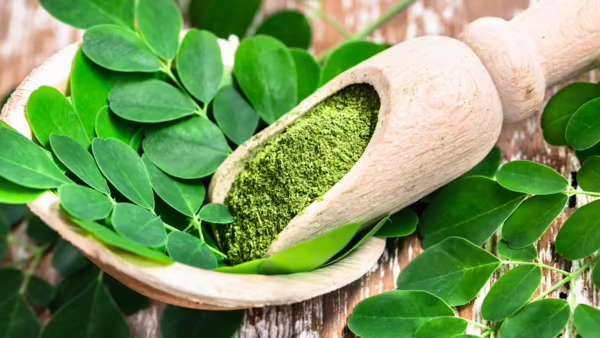In a world where superfoods like kale, quinoa, and chia seeds get all the spotlight, there’s one humble green that’s been quietly thriving in our backyards for centuries: Moringa leaves, also known as drumstick leaves. Packed with nutrients, healing properties, and a legacy of traditional medicinal use, moringa is truly the superfood hiding in plain sight.
What Are Moringa Leaves?
Moringa oleifera, commonly referred to as the drumstick tree, is native to the Indian subcontinent but now grows in many parts of Asia, Africa, and South America. Its long pods (drumsticks) are commonly used in Indian curries, but its leaves are the real nutritional goldmine. These small, green leaves are edible and can be consumed fresh, dried, or powdered.
Despite being highly nutritious, moringa leaves are often underutilized, especially in urban kitchens. But with growing interest in natural and plant-based diets, this forgotten green is making a comeback.
Nutritional Powerhouse
Moringa leaves are incredibly rich in vitamins, minerals, and protein. They contain:
- 7 times more vitamin C than oranges
- 4 times more calcium than milk
- 3 times more potassium than bananas
- 2 times more protein than yogurt
- 25 times more iron than spinach
They are also a good source of vitamins A, B1 (thiamine), B2 (riboflavin), B3 (niacin), and E. The high antioxidant content helps fight free radicals in the body, reducing oxidative stress and potentially lowering the risk of chronic diseases.
In fact, moringa is one of the few plants that provide all nine essential amino acids, making it a complete protein source—especially valuable for vegetarians and vegans.
Health Benefits of Moringa Leaves
- Boosts Immunity
Thanks to its high vitamin C and antioxidant levels, moringa strengthens the immune system, helping the body ward off infections and illnesses. It has been traditionally used in Ayurvedic medicine to treat colds and fevers. - Regulates Blood Sugar Levels
Several studies have shown that moringa leaves can help lower blood sugar levels, making it beneficial for people with diabetes or those at risk. Its natural compounds improve insulin sensitivity and reduce glucose absorption. - Improves Digestion
Rich in fiber, moringa aids in digestion and promotes a healthy gut. It helps regulate bowel movements and can be useful in treating constipation or bloating. - Anti-inflammatory Properties
Chronic inflammation is the root cause of many diseases. Moringa contains powerful anti-inflammatory compounds like isothiocyanates that may help reduce inflammation in the body, easing conditions such as arthritis. - Supports Heart Health
Moringa leaves help in lowering bad cholesterol (LDL) and maintaining healthy blood pressure, which supports overall cardiovascular health. Their antioxidant and anti-inflammatory properties further contribute to a healthier heart. - Enhances Skin and Hair Health
With high levels of vitamin A and E, moringa promotes healthy skin by reducing oxidative stress and increasing collagen production. Its rich protein content also supports stronger hair and reduces hair fall. - Helps with Anemia
Being exceptionally rich in iron, moringa is a natural remedy for treating iron-deficiency anemia. It boosts hemoglobin levels and improves oxygen transport in the blood.
How to Use Moringa Leaves
There are many ways to incorporate moringa into your daily diet:
- Fresh Leaves: Add them to curries, dals, soups, or mix into rice and roti dough.
- Powdered Moringa: Stir into smoothies, juices, or sprinkle over salads and cereals.
- Tea: Moringa leaf tea is soothing and offers a gentle detox.
- Capsules/Supplements: Available in health stores for those who want a quick nutrient boost.
When cooking moringa, it’s best to lightly steam or sauté the leaves to preserve their nutrients. Overcooking can reduce their nutritional value.
Precautions
While moringa is generally safe for consumption, moderation is key. Excessive intake can lead to digestive discomfort or interfere with certain medications. Pregnant women should consult a doctor before adding moringa in large quantities, as some parts of the plant may stimulate uterine contractions.
Conclusion
Moringa leaves may not have the glamour of imported superfoods, but they pack a far mightier nutritional punch. Affordable, accessible, and versatile, they are a true gift of nature—supporting health, healing, and well-being in countless ways. It’s time to dust off traditional knowledge and bring moringa back to the forefront of modern nutrition. This humble green deserves its place on every plate, not just as a forgotten leafy vegetable, but as a celebrated superfood.
So the next time you see a moringa tree in your neighborhood, remember—it’s not just a plant, it’s a powerhouse of life-saving nutrients hiding in plain sight.
Do Follow Us On Instagram







